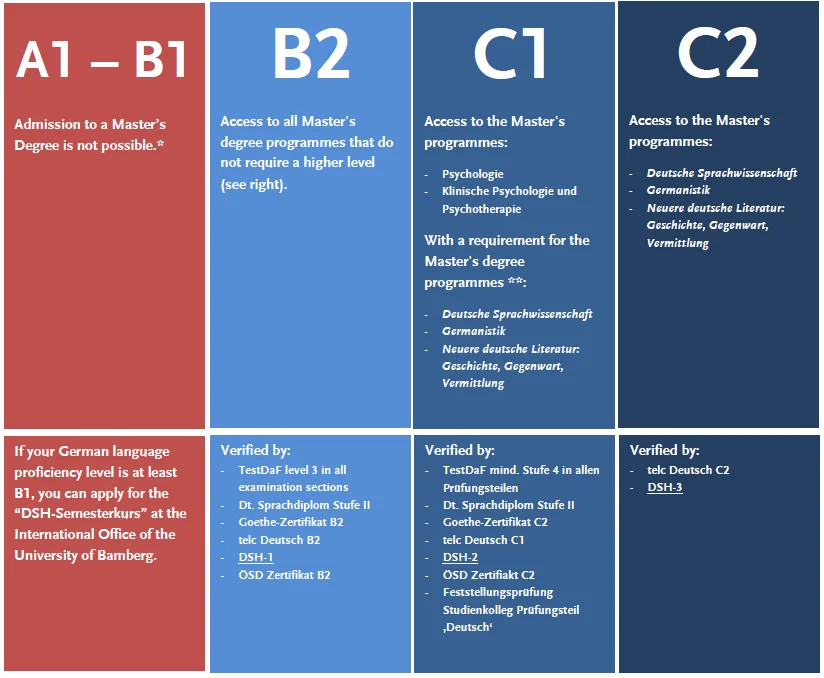Germany has emerged as a top destination for international students seeking to pursue higher education. Renowned for its quality education system, diverse academic programs, and affordable tuition fees, Germany offers numerous opportunities for individuals looking to pursue a Master’s degree. However, navigating the application process can be daunting, especially for those unfamiliar with the German higher education system. In this comprehensive guide, we will walk you through the step-by-step process of applying for a Master’s program in Germany, including requirements, costs, popular degrees, and much more.
Germany is globally recognized for its academic excellence and state-of-the-art research facilities. Pursuing a Master’s degree in Germany offers a multitude of advantages, such as:
- Strong academic reputation: German universities consistently rank among the best in the world, ensuring a high-quality education.
- Diverse range of programs: Germany offers a wide array of Master’s programs across various disciplines, catering to different academic interests.
- Affordable tuition fees: Most public universities in Germany charge minimal to no tuition fees, making it an attractive option for students.
- Strong job prospects: German universities have close ties with industries, providing excellent career opportunities for graduates.
- Rich cultural experience: Studying in Germany allows you to immerse yourself in a vibrant culture and explore the heart of Europe.
General Admission Requirements for Master’s Programs in Germany
While specific requirements may vary between universities and programs, there are some general prerequisites for applying to a Master’s program in Germany. These include:
- A recognized Bachelor’s degree or equivalent from an accredited institution.
- A strong academic background relevant to the chosen field of study.
- Language proficiency in either English or German (depending on the language of instruction).
- Academic transcripts and diplomas translated into German or English.
- Curriculum vitae (CV) highlighting your educational background, work experience, and extracurricular activities.
- Letters of recommendation from professors or employers.
- Motivation letter outlining your reasons for pursuing the Master’s program.
- Standardized test scores (e.g., GRE, GMAT) may be required for certain programs.

Language Proficiency Requirements
Language proficiency is a crucial aspect of your application, as it determines your ability to follow lectures, participate in discussions, and complete assignments. The language requirements vary depending on the language of instruction for your chosen program.
For English-taught programs, you will generally need to demonstrate proficiency through standardized tests such as the TOEFL or IELTS. Minimum scores are set by each university, so it is important to check their specific requirements. Some universities may also accept the Cambridge English Advanced (CAE) or the Pearson Test of English Academic (PTE Academic).
For German-taught programs, you will need to provide proof of German language proficiency. The most commonly accepted tests are the TestDaF (Test Deutsch als Fremdsprache) and the DSH (Deutsche Sprachprüfung für den Hochschulzugang). Each university sets its own language proficiency requirements, so be sure to check the specific criteria.
Academic Requirements
Apart from the general admission requirements, specific academic prerequisites may exist depending
on your chosen field of study. For example, certain programs may require specific prerequisite courses or prior knowledge in a particular subject area. It is essential to carefully review the program requirements and ensure that you meet all necessary qualifications.
Application Procedure
The application process for Master’s programs in Germany typically involves the following steps:
- Research and select your desired universities and programs.
- Check the application deadlines for each institution.
- Gather all the necessary documents, including your transcripts, diplomas, CV, letters of recommendation, and motivation letter.
- Apply directly to the universities either through their online portals or by submitting a physical application.
- Pay any required application fees.
- Track the status of your application and respond promptly to any requests for additional documentation or interviews.
- Once accepted, confirm your enrollment and prepare for the next steps, such as obtaining a student visa.
Costs of Studying in Germany
One of the most attractive aspects of studying in Germany is the low or non-existent tuition fees at public universities. Most states in Germany charge no tuition fees for Bachelor’s and Master’s programs at public institutions, irrespective of nationality. However, keep in mind that there may be semester fees or administrative charges that need to be paid.
Living expenses in Germany vary depending on the city and lifestyle, but students typically budget around 850 to 1,200 euros per month. This includes accommodation, food, transportation, health insurance, study materials, and leisure activities. Additionally, private universities in Germany may charge tuition fees, so it’s important to consider your budget and research all costs associated with your chosen program.
Scholarships and Funding Options
While studying in Germany is relatively affordable, there are several scholarships and funding options available to support international students. Some notable scholarships include:
- DAAD Scholarships: The German Academic Exchange Service (DAAD) provides a wide range of scholarships and funding opportunities for international students.
- Deutschlandstipendium: This merit-based scholarship program is open to both domestic and international students and provides financial support.
- Erasmus+ Scholarships: EU students can explore Erasmus+ scholarships, which offer funding for studying abroad within the European Union.
In addition to scholarships, part-time work opportunities are available for international students, allowing you to supplement your finances and gain practical experience.
Popular Master’s Degrees in Germany
Germany offers a diverse range of Master’s programs across various disciplines. Some popular fields of study among international students include:
- Engineering and Technology
- Business Administration and Management
- Computer Science and Information Technology
- Renewable Energy and Sustainability
- Medicine and Life Sciences
- Social Sciences and Humanities
It is essential to select a program that aligns with your interests, career goals, and academic background.
The German Higher Education System
Understanding the structure of the German higher education system can help you navigate the available options. The system comprises universities, universities of applied sciences, and colleges of art, film, and music. Each type of institution offers different types of degrees, research opportunities, and focuses.
Student Visa and Residence Permits
Most international students from non-European Union (EU) countries will require a student visa to study in Germany. The application process may vary depending on your home country, so it is essential to contact the German embassy or consulate in your area for specific instructions.
Once you arrive in Germany, you will need to obtain a residence permit to legally stay and study in the country. This permit is typically issued by the local Foreigners’ Office (Ausländerbehörde). Be sure to familiarize yourself with the required documents and apply for a residence permit within the stipulated timeframe.
Preparing for Your Life in Germany
Moving to a new country can be both exciting and challenging. To ensure a smooth transition, consider the following aspects:
- Accommodation: Start your search early and explore options such as student dormitories, shared apartments, or private rentals.
- Health Insurance: Health insurance is mandatory in Germany. Research the different options available and choose the one that best suits your needs.
- German Culture and Language: Familiarize yourself with German customs, traditions, and basic language skills. This will enhance your experience and help you integrate into German society.
- Networking and Socializing: Participate in student events, clubs, and organizations to meet fellow students and build a strong support network.
Conclusion
Applying for a Master’s program in Germany can be a transformative experience that opens doors to excellent academic opportunities and promising careers. By following this comprehensive guide, you now have a solid understanding of the requirements, costs, popular degrees, and various aspects of the application process. Remember to plan ahead, thoroughly research your options, and stay organized throughout the application journey. Good luck on your path to studying in Germany!
